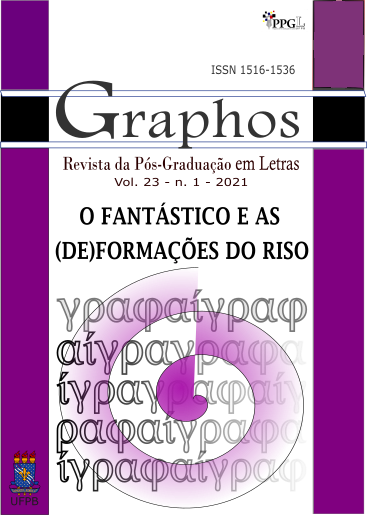Laughter as thaumaston agent in the ancient theater
DOI:
https://doi.org/10.22478/ufpb.1516-1536.2021v23n1.57377Keywords:
Laughter, Marvelous, Ancient Theater, Old Comedy, IronyAbstract
The marvelous (thaumaston) was discussed by Aristotle in Poetics, and in this work it is associated with the epic genre and tragedy, with specific characteristics in each of them, but this category is not mentioned in relation to comedy. But in this article we intend to reveal some examples that contradict this, artistic and theoretical, showing that the ironic metalanguage and metateatro, fundamental for a further notion of what constitutes the fictional game – including there the presence of the marvelous –, are already operated by laughter in comic stages of Antiquity. Through references to works of ancient theater that can still be read, or the themes of others that have not reached our days, as well as the analysis of some passages from the philosophical and aesthetic writings of Plato and Aristotle, we seek to understand this possible presence of the marvelous made possible by laughter and humor, perhaps indicating future paths of analysis. In this respect, it is also important for us to refer to a specific theoretical work, in fact, the summary of a possible previous class or writing, now lost, today called Tractatus coislinianus, which offers – or at least suggests – a theoretical possibility of this.
Downloads
References
ARISTÓFANES. A paz. Tradução de Maria de Fátima Sousa e Silva. Coimbra: INIC, 1989.
ARISTÓFANES. As vespas, as aves, as rãs. Tradução de Mário da Gama Kury. 3. ed. Rio de Janeiro: Jorze Zahar, 2004.
ARISTÓFANES. As nuvens. Tradução de Mário da Gama Kury. Rio de Janeiro: Jorge Zahar, 2013.
ARISTÓTELES. Poética. Tradução de Eudoro de Sousa. Porto Alegre: Globo, 1966.
COSTA, Lígia Militz da. A poética de Aristóteles: mímese e verossimilhança. São Paulo: Ática, 2003.
DEZOTTI, Maria Celeste Consolin. “O mimo grego: uma apresentação”. In: Itinerários: Revista de Literatura, n. 6, p. 37-46, 1993. Disponível em: http://hdl.handle.net/11449/107372 Acesso em: 19 nov. 2020.
DUARTE, Adriane da Silva. “Apresentação”. In: ÉSQUILO; EURÍPIDES; ARISTÓFANES. O melhor do teatro grego: Prometeu acorrentado, Édipo rei, Medeia, As nuvens. Tradução de Mário da Gama Kury. Rio de Janeiro: Jorge Zahar, 2013.
EURÍPIDES. Hipólito. Tradução de Trajano Vieira. São Paulo: Editora 34, 2015.
HOMERO. Tractatus coislinianus. In: HOMERO. Batracomiomaquia: a batalha dos ratos e das rãs. Tradução de Fabrício Possebon. São Paulo: Humanitas/FFLCH/USP, 2003.
HOMERO. Ilíada. Tradução de Frederico Lourenço. Lisboa: Cotovia, 2007.
MINOIS, Georges. História do riso e do escárnio. Tradução de Maria Elena O. Ortiz Assumpção. São Paulo: UNESP, 2003.
PAJARES, Alberto Barnabé. Fragmentos de épica griega arcaica. Madri: Gredos, 1999.
PLATÃO. Diálogos: Fedro; Cartas; O primeiro Alcibíades. Tradução de Carlos Alberto Nunes. Belém: Ed. UFPA, 1975.
PLATÃO. Parmênides; Filebo. Tradução de Carlos Alberto Nunes. Belém: Ed. UFPA, 1974.
PLATÃO. Leis; Epínomis. Tradução de Carlos Alberto Nunes. Belém: Ed. UFPA, 1980.
PLATÃO. A repúbica. Tradução de Carlos Alberto Nunes. 3. ed. Belém: Ed. UFPA, 2000.
SACCONI, Karen Amaral. Fragmentos de Aristófanes: estudo e tradução. Tese (Doutorado em Letras) – Universidade de São Paulo, São Paulo, 2008.
SÓFOCLES. Fragmentos. Tradução de José María Lucas de Dios. Madrid: Gredos, 1983.
Downloads
Published
Issue
Section
License
Copyright (c) 2021 André de Sena

This work is licensed under a Creative Commons Attribution 4.0 International License.







